- Home
- Iain Banks
The Bridge Page 4
The Bridge Read online
Page 4
Anyway, this is what I write:
Two
All day we had fought, under a topaz sky which slowly clouded over as though obscured by the smoke from our guns and the spreading fires below. The clouds turned dark red with the sunset; beneath our feet the decks were slick with blood. Still we fought, desperate now, though the light was going and our numbers were but a quarter of what they had been; the dead and dying lay thrown about like splinters, our proud ship's paint and goldleaf were blackened and burned, our masts were felled, and our sails - once puffed out bright and decorated as any military chest - now hung like half-burned rags from the mast-stumps, or covered the debris-littered decks where fires burned and dying men moaned. Our officers were dead, our boats were burned or smashed.
Our ship was sinking and burning; the form of its inevitable fate dependent only on whether the rising waters reached the powder magazines before the unchecked fires. The enemy vessel, wallowing across the wreckage-strewn sea, seemed in scarcely better condition than our own; a single holed and flame-sooted sail hung from her remaining, tilted mast. We tried to shoot down that remnant of her rigging, but we had no chain shot left, and no master-gunners left alive. Our powder on deck was almost finished.
The enemy ship turned towards us, closing. We used the last of our shot, then took up cutlass and boarding pistol. We left the wounded to their own devices. Lacking any yards to hang boarding lines from, we made ready to leap aboard the other vessel when she hit. The other ship fell silent too, the last dark clouds from her cannons blowing slowly ahead of her, over the dull red swell of the empty ocean. Our smokes mingled as the ships drew near.
The two, torn, bulbous hulls touched; we leapt across, away from our stricken vessel.
The collision felled our enemy's last makeshift mast, and the two craft separated again; like us they had used no hooks or grapples. We staggered shouting and cursing through the enemy galleon's decks as our old ship drifted away, but we found no men to fight, only the dead and the moaning wounded. We found no powder or shot, only rising waters and spreading fires. We found no ship's boats, only wreckage and charred wood.
Resigned, exhausted, we gathered on the sloping, splintered poop deck. In the smoky, flickering light of the spreading fires we looked out across the slow-increasing gap of littered, bloody ocean to our old ship.
Her masts were flame, her sails were smoke. Her reflection burned on the waters between us, a livid and inverted ghost.
Our adversaries stared back through the smoke at us.
My apartments are high up on this section of the bridge, close to the summit and not far from one angle of the squashed hexagon which the section resembles. It would appear that I deserve this exalted position because I am one of Dr Joyce's star patients. My rooms are wide and tall, and their walls on the seaward side are the glassed-in girders of the bridge itself. I can look out - from perhaps twelve hundred feet or more - in the direction we call down-river. That is, when the view is not obscured by the grey clouds which often submerge the bridge from above.
My rooms were quite bare when I came here from the hospital - I have improved them, adding several useful and decorative pieces of furniture, and a modest but carefully chosen collection of small paintings and little figurines and sculptures. The paintings mostly show details of the bridge itself, or are of the sea. I have several fine paintings of yachts and fishing vessels. The sculptures are, in the main, figures; bridge workers frozen in bronze.
It is morning now, and I am dressing, performing my toilet. I dress slowly, in measured stages. I have an extensive wardrobe; it seems only polite, having been given so many well-made clothes, to give some thought to their effect. They are, after all, a language; they do not so much say things about us, they are what is said. The bridge's menial workers, of course, have uniforms to wear, and don't have to worry about what to put on each morning. My envy for their way of life begins and ends there, though; they accept their lot and their position in society with a meekness I find both surprising and disappointing. I wouldn't settle for being a sewage worker or a coal miner all my life, but these people fit into the structure like happy little rivets, embrace their position with the adhesion and cohesion of coats of paint.
I comb my hair (a pleasantly intense black, and just curly enough to give it body) and select a cravat and matching enamelled pocket watch. I admire my tall and aristocratic reflection for a moment, and check that my cuffs are even, my waistcoat centred, collars straight, and so on.
I am ready for breakfast. The bed needs to be made, and yesterday's clothes require cleaning or putting away, but the hospital very considerately sends people to do that sort of thing. As I go to select a hat, I pause.
The television has switched itself on. It clicks and starts to hiss. At first, as I go through to the sitting room, I think I might be mistaken, that it will be a leaking pipe - water or gas - making the noise, but no, the screen built into the wall is on. It shows the same view as before: the man in the bed, silent and still and in monochrome. I switch the set off. The picture vanishes. I switch it back on; the sick man reappears, and the channel-changing control has no effect. The light is different. There seems to be a window set into the wall on the far side of the bed, beyond the encircling machines. I look carefully for any further clues. The picture is too grainy for me to be able to read any of the writing on the machines; I can't even tell what language is being used. How can the set switch itself on? I turn it off, and hear a droning noise outside.
From the windows of the room, I look out onto a blue, bright day. A formation of aircraft is flying past the bridge, from the direction of the Kingdom. There are three of them, identical, rather cumbersome-looking, single-engine monoplanes, flying one above the other. The lowest aircraft is about level with me, the middle plane is fifty feet above it, the highest plane another fifty feet above that. They fly past, engines droning, course steady, propellers glittering like huge protruding glass discs, and from the tail of each aircraft little dark bursts of smoke issue, seemingly at random. The small black clouds hang in the air, strung out like some strange code. A long trail of smoky signals marks the course of the planes, disappearing into the Cityward distance like some strange airborne fence.
This both puzzles and excites me. I have not seen or heard of any aircraft at all since I've been on the bridge; not even flying boats, which the bridge's engineers and scientists are obviously quite capable of constructing and operating.
These aircraft had no visible undercarriage - they certainly had no floats - and generally they looked quite unable to operate from water; I assume they have retractable wheels and come from an airport on land. I would find that encouraging.
The puffs of black smoke start to drift with the slow wind, heading towards the City. They dissipate as they go, into the wide blue sky. The planes' piston-engine noise gradually fades as well. The thinning black clouds seem to have a vague pattern; they are grouped in three-by-three grids, carefully spaced. I watch the gradually moving cloud-groups, waiting for the merging smoke-puffs to form letters or numbers, or some other recognisable shapes, but after a few minutes, all that is left is an indistinct hanging curtain of dull air being blown slowly Citywards like a gigantic scarf of soiled gauze.
I shake my head.
At the door I remember the malfunctioning television; but when I try to call the repair people the telephone isn't working either; it transmits a series of slow, not-quite-perfectly-regular beeps at me. Time to go. The world - the bridge, anyway - may be going mad, but a man must still have his breakfast.
At the elevator doors in the corridor outside, I recognise a neighbour. He watches the brass hand on the clocklike face of the floor-indicator above the closed doors, tapping one foot impatiently. He is dressed in the uniform of a senior timetabling official. He gives a little start; the carpet must have muffled my steps.
'Good morning,' I say, as the floor-indicator sweeps slowly up. The fellow grunts. He takes out his pocket watch and loo
ks at it; his foot taps faster. 'I don't suppose you saw those aircraft, did you?' I ask him. He looks at me oddly.
'I'm sorry?'
'The planes; the aircraft that flew past ... not ten minutes ago.'
The man stares at me. His eyes flicker as he glances at my wrist; he sees the plastic hospital bracelet. The elevator chimes. 'Oh yes,' the official says. 'Yes. The aircraft; of course.' The lift doors open smoothly. He looks round at the wood-panelled, brass-trimmed interior of the waiting elevator as I gesture for him to enter first. He inspects his watch again, mutters 'Excuse me,' and hurries off down the corridor.
I ride down alone. On a circular, leather-padded bench, I watch the rippling surface of a fish tank in one corner as the elevator rumbles down the shaft. There is a telephone by the door.
The brass instrument is heavy. I hear nothing for a moment, then a few small bleeping noises which at first sound like the odd tones I heard on my apartment's machine. These are quickly replaced by the voice of a rather surly operator. 'Yes? What do you want?' This is something of a relief.
'Oh, repairs and maintenance please.'
'What, now?'
The lift slows as it approaches the floor I want. 'No, never mind.' I hang up.
I leave the elevator on one of the upper arcade decks, where a brisk walk takes me - past small shops selling the fresh produce just arrived on the early morning goods trains - to the Inches breakfast bar. I stop on the way at a small flower stand and choose a carnation which will contrast nicely with the watch and the cravat.
The panelled, windowless walls of the breakfast bar are painted with competent but unconvincing views of green pastureland. It is a quiet, subdued place, with high ceilings and low lighting, thick carpets and thin porcelain. I am shown to my usual table, at the back. A newspaper lies folded on the table; it is concerned almost entirely with minute changes to the regulations and laws governing the running and maintenance of the bridge and its traffic, the promotions and deaths of the bridge's administrators, the generally quite remarkable boring society gatherings perpetrated by the same groups, and with some of the complicated, arcane and little-played sports and games popular with these mandarins.
I order smoked fish fillets, devilled lamb's kidneys, toast and coffee. Putting the paper aside, I gaze up at the painting on the opposite wall. It shows a sloped meadow of brilliant green, bordered with evergreens and sprinkled with bright flowers. Across a shallow valley there are tree-lined hills, edged in sunlight.
Were these scenes painted from life, or did the places exist only in the artist's head?
Coffee is brought. I have never seen a coffee plant on the bridge. My lamb's kidneys must come from somewhere, but where? On the bridge we talk of down- and up-river, and of Citywards and Kingdomwards; there must be land (would a bridge make sense without it?) but how far away?
I did all the research I could, given the limitations of both language and access which the organisation of the bridge's facilities impose on the amateur investigator, but for all my months of work, I came no closer to discovering the nature or location of either the City or the Kingdom. They remain enigmatic, placeless.
My long-abandoned requests for information are doubtless still sinking through the miasmic layers of bureaucratic ooze that represent the bridge authorities' organisational structure; I have the impression that all my original questions concerning the size of the bridge, what it is bridging, what it connects, and so on, will have been handed on, rephrased, precis'd, tidied-up, glossed, paraphrased and retransmitted so often and between so many different departments and offices that by the time they come to be considered by anybody capable of- and willing to - answer them, they will be virtually meaningless ... and that should they by some miracle survive this process just uncontaminated enough to be comprehensible, any reply, however considerately helpful and paradigmatically clear, will even more certainly have generated into utter incomprehensibility by the time it finally reaches me.
So frustrating did I find the whole investigative process that at one time I seriously considered stowing away on an express train and just going looking for the damned City, or the Kingdom. Officially my wrist band, which identifies me and informs tram conductors which hospital department to charge my ticket to, restricts my travel between two tram termini only; a range of a dozen bridge sections and about the same number of miles in each direction. Not an ungenerous allowance, but a restriction, nevertheless.
I decided not to become a stowaway; I think it is more important to recover the lost territories inside my skull than to go exploring for lost lands here. I shall stay put; when I'm cured I might go.
'Morning Orr.'
I am joined by Mr Brooke, an engineer I met in hospital. A small, dark, pressured-looking man, he sits down heavily opposite me and scowls. 'Good morning, Brooke.'
'See those damn . . .' His scowl deepens.
'Aircraft? Yes. Did you?'
'No, just the smoke. Damn cheek.'
'You disapprove.'
'Disapprove?' Brooke looks shocked. 'Not up to me to approve or disapprove, but I called up a chum of mine at Shipping and Timetabling, and they didn't know anything about these . . . aircraft. Whole thing was totally unauthorised. Heads will roll, mark my words.'
'Are there laws against what they did?'
'There's no law to permit it, Orr, that's the point. Good grief man, you can't have people going off and doing things just because they want to, just because they think something up! You have to have a... a framework.' He shakes his head. 'God, you have some odd ideas at times, Orr.'
'I'd be the last to deny it.'
Brooke orders kedgeree. We were in the same ward in hospital, and he has also been a patient of Dr Joyce's. Brooke is a senior engineer specialising in the effect of the bridge's weight on the seabed; he was injured in an accident in one of the caissons which support some of the structure's granite-shod feet. He is physically recovered now but still suffers from acute insomnia. Something about Brooke always makes me think of him as ill-lit; even in direct sunlight he always seems to be standing in shade.
'Another strange thing happened to me this morning,' I tell him. He looks wary.
'Really?' he says. I tell him about the man in the hospital bed, the television which switches itself on, and the malfunctioning phone. He seems relieved. 'Oh, that sort of thing happens all the time; crossed lines somewhere, I'll bet. You get on to Repairs and Maintenance and keep annoying them until they do something about it.'
'I shall.'
'How's that quack Joyce?'
'Still persevering with me. I've started to have some dreams, but I think they might be too ... structured for the good doctor. He practically ignored the first one. He critised me for giving up my investigations.'
Brooke tut-tuts. 'Well, Orr, he's the doctor and all that, but if I were you I wouldn't waste any more time on all these ...' He pauses, searching for a suitable severe epithet, '... questions. Not likely to get you anywhere, you know. Certainly can't see it getting your memory back. Nor will mooning like a schoolgirl over that sort of stuff.' He gestures dismissively at one of the pastoral scenes on the wall, frowning as though pointing out some unsightly blemish on the varnished panels.
'But Brooke, don't you ever want to see something other than the bridge? Mountains, forest, a desert? Think of-'
'My friend,' he says heavily, watching a waiter pour him some coffee, 'do you know how many different types of rock the foundations rest upon?' He sounds patient, almost tired. I am going to be lectured, but at least this will give me a chance to eat my devilled kidneys, which have arrived and are cooling.
'No,' I admit.
'I'll tell you,' Brooke says. 'No less than seven major different types, not counting traces of dozens of others. Every type of strata is represented: sedimentary, meta-morphic, and both intrusive and extrusive igneous rocks. There are major deposits of basalt, dolerite, calciferous and carboniferous sandstone, basaltic and trachytic agglomerates, basaltic la
vas, tertiary and old red sandstone and considerable amounts of schistose grit, all present in complex folded systems whose histories have yet -'
I can stomach no more rocks. 'You mean,' I say, as his kedgeree arrives (he coats it with a snowstorm of salt and deposits pepper on it like a layer of volcanic ash), 'that the bridge has more than enough to offer the enquiring mind without recourse to anything outside it.'
'Precisely.'
I'd have said it was more like approximately, but never mind. Anyway, there is something beyond the bridge, something I can almost but not quite remember. I seem to possess abstractions, general ideas, for things I could never find on the bridge; glaciers, cathedrals, automobiles ... a nearly endless list. But I can recall nothing specific, no particular images come to mind. I can cope with my single language and with the customs and mores of the bridge (all surely the product of training at some point), but I can remember nothing of my schooling, my upbringing. I am complete in everything but memories. Where other people have the equivalents of encyclopedias and journals, I have ... a pocket dictionary.
'Well, I can't help it, Brooke,' I say. 'There just seem to be so many things one can't talk about here: sex, religion and politics, for a start.'
He pauses, a forkful of kedgeree poised halfway to his mouth. 'Well,' he says uncomfortably, 'there's nothing wrong with ... the first one, if one's married, or the girl has a licence or whatever ... but damn it, Orr,' he puts the fork down again, 'you're always going on about "religion" and "politics"; what exactly do you mean?
He seems to be serious. What have I got myself into? First this and then a session with Dr Joyce to follow. All the same, for the next ten minutes I attempt an explanation for Brooke. He looks increasingly mystified. Finally, once I have finished, he says, 'Hmm. Don't know why you need two words; they sound like the same thing to me.'

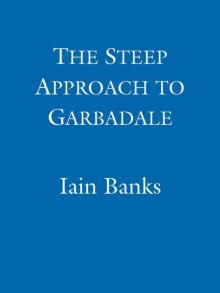 The Steep Approach to Garbadale
The Steep Approach to Garbadale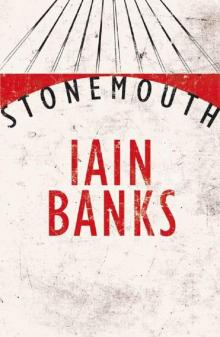 Stonemouth
Stonemouth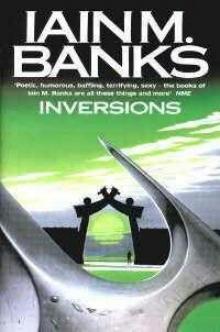 Inversions c-6
Inversions c-6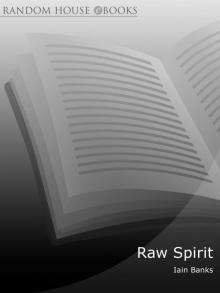 Raw Spirit: In Search of the Perfect Dram
Raw Spirit: In Search of the Perfect Dram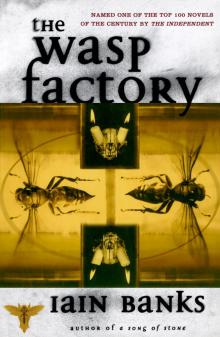 The Wasp Factory
The Wasp Factory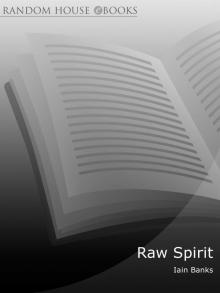 Raw Spirit
Raw Spirit Walking on Glass
Walking on Glass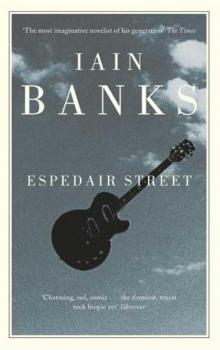 Espedair Street
Espedair Street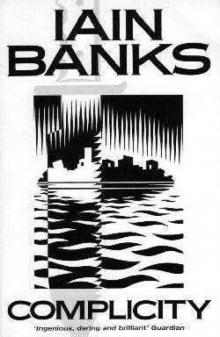 Complicity
Complicity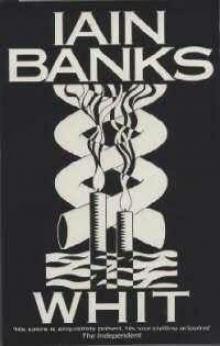 Whit
Whit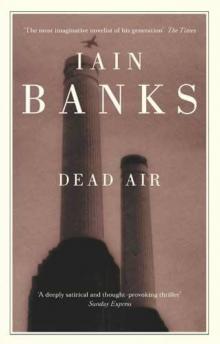 Dead Air
Dead Air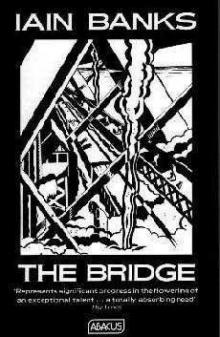 The Bridge
The Bridge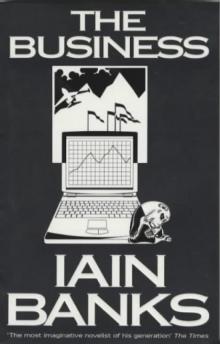 The Business
The Business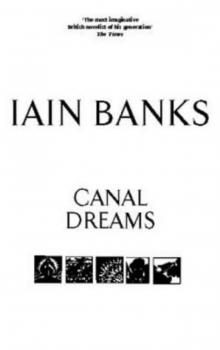 Canal Dreams
Canal Dreams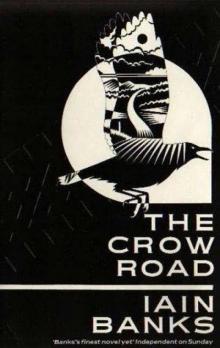 The Crow Road
The Crow Road